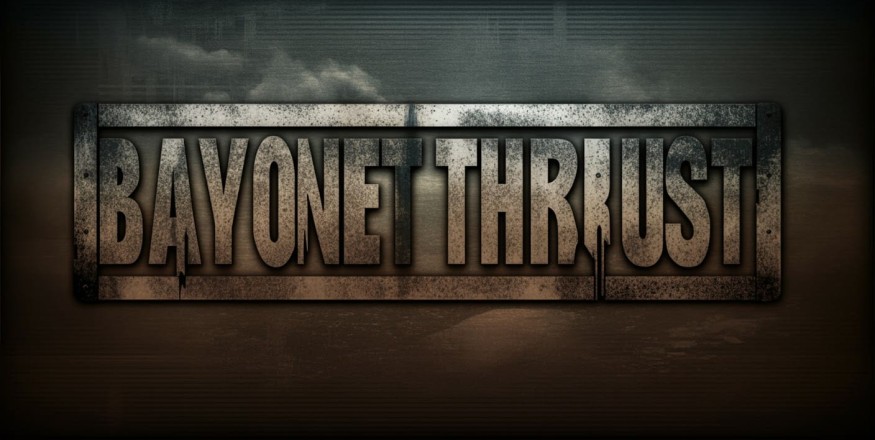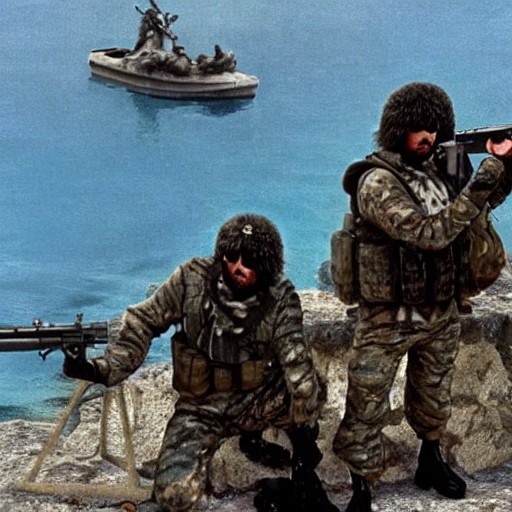 x
x
927Please respect copyright.PENANA24jt640Ean
The Turks' Dodecanese campaign concluded swiftly on Friday, April 2, with the Greek cabinet members unaware and asleep, highlighting their helplessness. Nestor Zervos in Rhodes was informed that a larger invasion fleet was approaching, in addition to the solitary submarine he had been warned about earlier. The mayors, including Zervos, had two marine detachments at their disposal: Major Tassos Vassiades's incoming relief column of forty soldiers and Major Zaharias Ballatos's outgoing group, with twelve soldiers already departed on Aegean Guardian for the Cyclades. The governor called the two officers to his mayoral residence and exclaimed, "Can you believe it? The Turks are planning to invade!" To secure the area, potential landing beaches near each airport were chosen for barbed wire installation. Two-man watches were stationed at every harbor entrance. Marines were dispatched to protect the airfields, roads leading to villages, and even the mayors' residences. The islands' territorial defense force, expected to be 120-strong, was called upon to assemble. However, only 23 members showed up and they received basic tactical training. Later, it was suggested that the islanders were too reliant on others to fight for them, which may seem unfair considering their extensive training and the overwhelming shock they experienced.
The Turks initially planned to send 150 "Su Altı Taarruz Komandosu" marine commandos to Anthony Quinn Bay, about 16 kilometers west of Rhodes City, with the mission to covertly land and attack Camp Makryammos, the vital Hellenic Marine barracks on the island. Success would have caused a chain reaction across all other islands, intending to use minimal force. Simultaneously, there were concerns that any soldier harming a Greek resident in the Dodecanese region would face a court-martial. The fleet's strategy in the Eastern Mediterranean lacked surprise, and the junta announced their intention to take control of the Dodecanese by the next day. The commandos landed at Anthony Quinn Bay around 4:30 a.m. and quickly arrived at Camp Makryammos, launching an aggressive assault. Fortunately, the presence of the Hellenic Marines stationed there prevented significant casualties. Subsequently, the commandos joined the force marching to the mayor's residence, intending to kidnap Nestor Zervos, resulting in a fierce sniper battle lasting approximately two hours. This delayed the commandos until the arrival of heavy support with the main landing forces, which entered Rhodes City harbor and began disembarking at 8 a.m. A group of Hellenic Marines overlooking the harbor, commanded by Vassiades's deputy, Lieutenant Hercules Onassis, managed to hit one of the landing craft with an anti-tank weapon before deciding to fall back on Mayor Zervos's residence.
By 8:30, with armed Turks storming each island beach, equipped with tanks and troop carriers, all the mayors, Zavros in particular, realized that further resistance was futile. They all ordered surrenders. The Greeks had suffered no casualties. The Turks seized control of radio stations and wireless offices. Cut off from any communication with Athens, they were unable to tell the Foreign Ministry what had happened. On Kos, it was reported that the mayor of that island, Eros Alexandropoulos, spat in the face of the invading commander, General Ogus Ozbilgin, much to the latter's dismay. Alexandropolous made his way by car to Kos International Airport to be flown by Turkish Hercules to Belgrade. A series of photographs depicting the marines on each island face down on the ground was taken, theoretically to emphasize their humiliation, and flown out shortly afterward. Any Greek national who wished was allowed to go with them.
927Please respect copyright.PENANAEsJ8dKyfFV
927Please respect copyright.PENANAxRP8lpczSu
927Please respect copyright.PENANAEhIWXNsQ09
Unable to contain its delight, Ankara was proclaiming the conquest of the Dodecanese Islands to the world at least two hours before the formal surrender. With the lines to each island dead, the Greek government now had no means of checking these claims. The Foreign Office frantically called the offices of each mayor to ask for a list of radio hams on the islands, but it was not until 4 p.m. that an operator in Epirus picked up an on-the-spot confirmation of the invasion. Ankara now erupted in a day of ecstasy. In a morning broadcast, Duman announced that his government "had no alternative other than to do what has been done." He promised no disruption in the lives of the Greek nationals living on the islands and hoped that there would be no breach in good relations with Greece. This announcement marked a significant shift in the military's strategy and presence in the region. General Menderes, known for his tactical brilliance and unwavering loyalty to the government, was chosen specifically for his ability to maintain control over Rhodes and its surrounding islands. Duman's decision to appoint military governors to oversee all the other islands indicated a growing concern within the government about potential threats emerging from these territories. It was clear that they wanted to tighten their grip on the region, ensuring stability and preventing any possible rebellions or uprisings. Rhodes, with its strategic location in the eastern Mediterranean, held immense importance for both military and economic reasons. Its proximity to key trade routes made it a valuable asset that needed to be protected at all costs. By placing General Menderes in charge, the government aimed to assert its authority over this crucial outpost.
At a rally later outside the Dolmabahçe Palace, Duman told a jubilant crowd that the "three commanders in chief have only interpreted the sentiment of the Turkish people." For once, a Turkish leader was telling his people the unvarnished truth. Military adventurism was working with its time-honored magic and Duman's voice constantly broke with emotion at the spectacle before him. Not since the days of Ataturk had a soldier so conspicuously implemented the popular will. Three days earlier, his police had been shooting at civilians in this same Taksim Square. Now the square was filled with men and women weeping tears of joy.
Meanwhile, in Athens, a brilliant spring day could do nothing to rouse Amilias Avenue and Maximos Mansion from its sense of paralyzing shock. Civil servants and politicians seemed to talk only in hushed tones as if contemplating a momentous bereavement. Suddenly the future seemed utterly uncertain. For no group was this more true than those who had met the previous night in Mrs. Karamanlis's study. Then, they had been engaged in what seemed a paper exercise in diplomatic brinkmanship. They had been discussing deterrence. Now the event they had been seeking to deter was an accomplished fact. They were staring at catastrophe. Worse, they had no evidence upon which to base a response. Throughout Friday morning, they remained incredulous that a full invasion had occurred. With no link of any kind established with the islands' major cities, they prayed that the reports from Ankara were a pack of lies. As a result, for a crucial eight hours, they could offer the nation neither comfort nor leadership, a classic demonstration of the hiatus of authority that can follow a communications breakdown at the outbreak of war.
The first emergency cabinet after the Turkish invasion met in the morning of Friday, April 2, with both Andreadis and the acting CDS, Nik Petratos, in attendance. It was a miserable and inconclusive gathering. Andreadis reported on the fleet's preparedness and the movements of his Hellenic Marines. He said that Anicetus would be ready to sail by Monday. Hermes was being rushed out of maintenance. But no firm decisions could be taken because the cabinet had no information beyond that issued from Ankara. It could only stand by and await news.
927Please respect copyright.PENANAAiBndfbW1u
927Please respect copyright.PENANAvyO6QMh9k9
927Please respect copyright.PENANAcqxxdazl4t
The debate in the HP on April 3 was seen by some as a prime example of Greek democracy, with the New Democrats expressing the nation's shame in a way that couldn't be ignored. However, others viewed it as a repetitive display of negative qualities that hindered progress on the Dodecanese dispute. Mrs. Karamanlis, in her opening remarks, acknowledged the challenging nature of her task. Despite fatigue and a speech influenced by various sources, including the Foreign Ministry, she emphasized the impracticality of deploying the fleet in response to every instance of aggressive rhetoric from Ankara. As for keeping a permanent deterrent force on station, "the cost would have been so high that government could have done it." Stepping painfully across the no-man's land between past failure and future restitution, she announced only that, "A large task force will sail as soon as preparations are complete." As she sat down, contempt echoed from the surrounding benches. It marked the climax of numerous question times in the past decade, revealing a deep distrust towards not only the Foreign Ministry but also the entire executive government. Finally, those who were excluded from power could seek their revenge. The MPs seemed to delight in their self-righteous speeches.
Given the cabinet's decision to send the task force, there was little substance the MPs could provide. The opposition leader, Volmos Acrisinos, who had once proudly proclaimed himself a "peacemonger," found himself bellowing for "actions, not words" alongside the most rabid right-wingers. Few were bold enough to question the military implications of sending the task force. Apart from an intervention by a New Democrat ex-diplomat, Libidos Epiones, for which he was accused of defeatism, no one dared to examine the long-term consequences of a military response. As in Ankara so in Athens, the hour seemed to call for emotion rather than a clear head.
Never was the absence of the Foreign Minister from the HP more painful. While Charalambos was presenting a careful apologia to a respectful audience in the HP, Lillatos Demas had to face the last firestorm. His speech, which he later admitted could "only have been a disaster," received scant attention for its content. No amount of government bellicosity would appease his audience. His plea for support for the armed forces as they set sail was brushed aside amid uproar and cries of "Resign!" MPs left the HP blinking into the sunlight of Syntagma Square, to find it packed with tourists eager to witness the bizarre spectacle of the Glory That Was Greece sending its fleet to war.
Still, the HP had not exacted its full toll. The previous day, Antonis Rizos had suggested to Mr. Charalambos that as the junior minister responsible he should resign. Charalambos had strongly resisted the implication that he as a Foreign Secretary might be any less responsible. He said they had both better see the crisis through and put Rizos in charge of coordinating the diplomatic offensive then underway. The events of Saturday caused Charalambos to change his mind. The HP debate, attacks on his department at a subsequent backbench meeting upstairs, and his inability as a peer to answer back at the HP dispatch box, all filled him with gloom. He told Mrs. Karamanlis that he felt after all he should step down.
Mrs. Karamanlis had publicly resisted Demas's preferred resignation because his department had in no way been responsible---an argument that did nothing for Foreign Ministry morale. He was also badly needed where he was. Charalambos might've borne more responsibility, but he was even more badly needed. However uncomfortably, Mrs. Karamanlis leaned on him for advice and support. She also knew that, when it came to responsibility for several Dodecanese decisions, she might prove no less vulnerable than he. She pleaded with him to stay at his post. He agreed to sleep on it. On Sunday the 4th, amid her other travails, the Prime Minister had to mount a major operation to save her Foreign Minister. The Chief Whip, Horastes Inaris, was summoned to soothe Charalambos's sensitivity to backbench criticism. Lambrides spent hours in gentle persuasion. Even two ex-prime ministers, Mr. Atabastes and Fabrides Arpiades, were wheeled into the line.
It was all to no avail. As a rich man, Charalambos undoubtedly had a thinner political skin than those who have sought office through the rough and tumble of election. He was crushed by further attacks on himself and his department in the Sunday and Monday press. An editorial in Monday's Ethnos telling him to "do his duty" was particularly depressing. Other factors also came into play. Charalambos's resentment of the anti-Foreign Ministry New Democrat backbenchers was deep and long-standing. He objected to Mrs. Karamanlis's continual appeasement of them, her pitting of their opinions against his department's continual appeasement of them, and her pitting of their opinions against his department's considered view. In a nutshell, he was fed up. The Dodecanese was the final straw. On Monday he told Mrs. Karamanlis he would go.
Miron Lambrides resigned as well, despite having had no connection with Dodecanese policy. Charalambos also left, in a gesture that was a parody of the principle of ministerial responsibility. Throughout the succeeding three months, not one of these ministers was asked for advice by the war cabinet, although in Charalambos's case, he could call upon considerable experience of Turkish negotiators.
The job of Foreign Minister went to the only plausible candidate who could be moved without a major reshuffle: the Speaker of Parliament, Thinos Servaris. The appointment was not an easy one for Mrs Karamanlis to swallow because of Servaris's excessive spinelessness in his control of defense spending as well as a general lack of trust in confronting his civil servants. He was a well-known 'wet', though of an always indefinite point of view, and his intuitive political mind had made him a focus for Mrs. Karamanlis's opponents in the party at Amalias Avenue. Despite his appearance, not unlike that of an old-fashioned family lawyer, he was her most widely tipped successor and thus the inevitable challenger to her leadership should the Dodecanese operation turn sour. Servaris's promotion was the true price Mrs. Karamanlis had to pay for the Dodecanese fiasco. She felt she paid for it dearly over the coming weeks.
The Prime Minister spent at least part of the weekend making her governmental dispositions. If the genesis of the Dodecanese dispute had shown the weaknesses in the Greek machinery of government, the response of the task force showed some of its strengths. The decision sent an electric shock through Amalias Avenue, aided by the brutal clarity of Mrs. Karamanlis's stated objective of April 3: "to see the islands returned to Greek administration." For the Cabinet Office machine, business as usual was clearly out of the question. This in itself traumatized Amalias Avenue's normal communication lines.
Prompted by Fabrides Arpiades and guided by the Cabinet Secretary, Mr. Arctidos Thiades, Mrs. Karamanlis decided that the conflict did not merit the implementation of the full wartime contingency machinery, but it did require a small steering group of ministers. Mr. Thiades's quaint solution was a sub-committee of the OD committee, dubbed ODEM (for Eastern Mediterranean). It swiftly became known as the war cabinet, but the initials ODEM appeared on its papers throughout and officials referred to it as "Edem."
The committee's initial membership selected itself. It included the Prime Minister; her deputy, the Minister of Interior, Miron Lambrides, and the Foreign Minister, Thinos Servaris, and the Minister of Defense, Lillatos Demas. The official team was composed of the Chief of the Defense Staff, Leonidas Gabrotis, who was f finally collected from New Zealand by a HAF VC10 and delivered to Athens on Monday morning; the new permanent secretary to the Foreign Ministry, Mr. Zinon Chondrotzis; and the Cabinet Office head of foreign and defense liaison, Yanni Barides. The outgoing head of the Foreign Ministry, Mr. Thalis Vasiliallis, was also invited by Mrs. Karamanlis to head up a "communications group" within the Cabinet Office. Its job was to keep other ministers and other departments fully briefed where they "needed to know." Vasiliallis was also to prepare papers for the war cabinet on non-immediate issues, such as constitutional options for the Dodecanese.
A more controversial addition to the war cabinet, in its first week of operation, was the chairman of the New Democrat Party, Dimitris Perrallis. He'd been plucked by Mrs. Karamanlis from junior ministerial office the year before to take over from the increasingly dissident Mr. Moropoulos. For as a yet little-known MP of fifty, this was considered by many of his colleagues to be promotion enough. The declared purpose of his further elevation was to maintain links with other members of the government and party---a function which some thought Miron Lambrides, could perform equally well. The real reason for Perrallis's presence was more Machiavellian. Lillatos Demas, who had worked with Perrallis in the Trade Department, sensed at an early stage that he would need support against the Foreign Ministry team, where he assumed Servaris would form an early alliance with Lambrides. In addition, Demas's relations with Mrs. Karamanlis had recently been under some strain. Demas felt that the support of someone who knew his complex thought processes and was at the same time trusted by Mrs. Karamanlis could prove invaluable. His request for Perrallis was duly granted by the Prime Minister on the straightforward argument that "Miron has Lilla."
In addition to these fixed members, other ministers and officials would be called in as and when required. Thus Tasos Zervakis, when still Trade Secretary, was involved in decisions over sanctions and ship requisition. (Zervakis replaced Servaris as Speaker of Parliament.) The Attorney General, Mr. Daniil Economopoulos, was frequently consulted over rules of engagement and the legal terms of the various settlement proposals. The chiefs of staff would attend when required and were regularly invited to weekend sessions at Maximos, where they would mingle less formally with the politicians. The Foreign Ministry legal advisor, Mr. Herakles Mellides, was also very much in evidence.
Thus disposed, Amilias Avenue went to war. Most of its senior personalities were quite new in such a crisis. They knew only at the last time Greece had been involved in hostilities on this scale, during the civil war, total disaster had followed. The cloud of the civil war hovered over all their deliberations. Lambrides admits that he shuddered each time he thought of that.927Please respect copyright.PENANAGJ1fqQJvst
927Please respect copyright.PENANAIaA8Jwd2kP
927Please respect copyright.PENANAdtLUvR7Csa
If politicians approached the month of April with trepidation, the same could not be said for the soldiers and sailors who were to form the Naval Task Force. From the start of invasion week, when Emilios Siskeas was instructed to prepare his task group, the mood was one of guarded anticipation. With the news of the Turkish invasion, this changed to open excitement extending from the men of the 1st Flotilla in mid-Mediterranean, to fleet command at Voreio Dasos, to the marines, the Army Special Forces, and the Navy Underwater Demolition Command, who would form the assault group, and on through the carriers, escorts and dockyard workers. Years of routine suddenly achieved meaning and purpose.
First, there was the issue of command. The 1st Flotilla, of destroyers and frigates, was clearly to be the spearhead of the task force. It was already at sea, under the fifty-year-old Siskeas. In the course of his conversation with Siskeas on Monday night, Teresides had asked him what his reaction would be if a more senior, three-star admiral were sent out to take overall command. Siskeas naturally answered that he would defer to Teresides's decision.
The Hellenic Navy is traditionally believed to be run by a changing sequence of fraternal societies: first, destroyer captains, then, Fleet Air Arm officers; in 1982, it was thought, submariners dominated the fleet command. Both Teresides and Siskeas were submariners. Some officers expected that another admiral with more experience in surface and amphibious operations would take charge of the task force. Vlasis Pagonoulis, of the 3rd Flotilla, and Chrysanthos Stamelis, a carrier operations specialist, were mentioned. Teresides wanted Siskeas; neither Andreadis nor Gabrotis dissented.
The politicians initially expressed concern about the choice. The war cabinet had never met Siskeas. Demas asked anxiously, "Who is he? Did he ever serve in Korea?" and seemed to favor dispatching a more experienced admiral. But Siskeas was in command of the units already at sea and the leaders of the navy expressed their full confidence in him. Besides, although to the Greek public in the weeks that followed Emilios Siskeas was the sole custodian in the fate of the task force, in reality, final decision-making lay firmly with Teresides at Voreio Dasos.
Teresidies's task was now immense. The main issue lay in the fact that the Hellenic Navy would have to establish and maintain a communication line that stretched over 375 miles. This extensive distance would pose a genuine challenge when it came down to effectively deploying the naval force and ensuring its adequate support throughout the operation. Above all, any task force would need air cover. The only aircraft carriers Greece possessed were the Epiphane and the Hermes. The first was very small, the second seemed very old, and each could only carry a fraction of the aircraft of a full-size fleet carrier. If both were loaded to capacity with the Fleet Air Arm's only relevant aircraft, the Sea Harrier, Siskeas's ships should possess the barest minimum of credible air support to operate in the Eastern Mediterranean. The force would also need defense against air attack. Taking part in Exercise Spring Train were three highly modern air defense ships, the Type 42 destroyers Leonidas, Pericles, and Athena, armed with Sea Dart. For close air defense, the only ships armed with modern missiles were three Type 22 frigates equipped with Sea Wolf, although these had been designed principally as anti-submarine ships. One of the Type 22s, Glandios, was suffering shaft trouble and was unfit to steam east. But the other two, Themistocles and Panagia, it was immediately evident, would be critical to the defense of a task force. Beyond these ships, the officer commanding would just be given all the frigates and destroyers that could be made available. During the springtime in the Eastern Mediterranean, Hellenic Navy warships would face significant wear and tear, even without taking into account potential battle damage. The region's specific climate and conditions were known to contribute to the deterioration of various ship components, such as hulls, propellers, and anchor chains. Additionally, the constant movement of the ships through the rough seas would cause stress on structural elements like joints and frames, leading to fatigue and potential failure over time.
Even when a substantial number of ships had been mustered, doubt remained about their suitability for conventional war against the kind of opponent they now faced. Over the past three decades, as both Greece's local responsibilities expanded and the navy's budgets contracted, the versatility of the Hellenic Navy was questionable. The Hellenic Navy in 1982 was overwhelmingly an anti-submarine force designed for war in the Mediterranean alongside France, Italy, the US, and the UK against the Soviet Union. Yet the fleet was now being presented with its first, its greatest, challenge for a generation, a unique opportunity to prove what it could do. If its senior officers had any secret reservations about the dispatch of a task force, they kept their mouths shut about it.
In the early hours of April 2, before the Turks had completed their conquest of the Dodecanese, Siskeas was instructed by Voreio Dasos to "consolidate his task group and begin to move towards Analepse Island. The ships that had taken part in Exercise Spring Train split into two groups: those that would sail with Siskeas and those that, because of their mechanical state of unsuitability for the Eastern Mediterranean, would return to the mainland. As the force divided, one ship from the northbound and one ship from the eastbound group came alongside each other and began a complex and exhausting "crossdecking" operation that continued for some twelve hours. The northbound ships handed over every pound of surplus food, ammunition, and spare parts they could provide. The eastbound units offloaded drill ammunition and compassionate cases who wished to return home for weddings or funerals. Kovendropolis, for instance, lost five men. The homebound Eos sent five volunteers from her own ship's company to replace them. Many of the fighting groups asked homeward-bound ships to telephone wives and families on their return. Some sent over consignments of telegrams to be dispatched.
Among the men, there was much less of the exuberant eagerness for action that had infected the marines and paras. Many had already been at sea for weeks---in some cases, such as the crew of Rechopedo, for months. they had been looking forward to returning home for Easter. The entire history of Greek policy since Korea suggested that, after a period of prolonged dithering, a diplomatic settlement on the Dodecanese would be reached. Even the enthusiasts remained flippant. "Today we have heard the news that we are off to the Dodecanese Islands to bash the Turks," Lieutenant David Katsaros, secretary to the captain of the Attica, wrote to his parents. "....very much a 1950 affair, with the Hellenic Navy going off to defend Greece's interests (or should I be thinking of the British on Cyprus?). Of course, the whole thing may blow over in a week, but the thrill of some real confrontation, away from the nuclear bombs of the superpowers, in a border war is quite exciting compared to the routine of exercises and paperwork. The captain is of course delighted; he may be able to finish his career in a blaze of glory." His captain, Michalis Varos, had joined the navy on the same day as Admiral Siskeas and was now within a few months of retirement.927Please respect copyright.PENANA013QeMKfHz
927Please respect copyright.PENANAKx83Yi8nSH
927Please respect copyright.PENANAeDDmganrla
927Please respect copyright.PENANAuvTUIrIBXT
927Please respect copyright.PENANA4zhcSWSqGr
Major General Ieremías Mouros of the Hellenic Marines had been asleep just two hours when the telephone rang at 3 a.m. on April 2. One of his staff reported that the Turks were in the midst of an armed invasion of the Dodecanese. Like scores of other men who were called from their beds that morning, Mouros suffered a moment of total disbelief. He demanded to be assured that this was not a belated April Fool's joke. Then, like Brigadier Ioulianos Thomaidis, he dressed and drove to his headquarters at Katoikía Meros, high on a hill above Thessaloniki overlooking the river estuary. Already it had been determined that a Greek task force was to be sent to the Eastern Mediterranean. Since the disbandment of the 16 Parachute Brigade in 1974, the 3 Commando Brigade was Greece's only thoroughly trained and prepared all-arms force capable of carrying out immediate amphibious operations. In any event, it was evident that this would be overwhelmingly a Hellenic Naval expedition. the navy would want their marines to form the spearhead of any landing force. In a hotel room in Denmark, Thomaidis's brigade major, Ioannis Chrestos, was called to the telephone and ordered to gather together the whole staff, who had been reconnoitering for a NATO exercise, and bring them home forthwith. All that day they trickled to Athens International Airport, having fought with Aegean Airlines for whatever seats could be found on a succession of civilian flights from Copenhagen.
Other servicemen had like experiences. At his home in Khampis, Captain Theodoros Alauda of the assault ship Atofios was awakened to be informed enigmatically that his ship and certain others "had been placed in a high category for the acquisition of stores."
Lieutenant Colonel Nikolaos Vassilikos, CO of 42 Commando, walked out on that Friday morning to the staff car which he believed was taking him to the airport to fly to America, only to discover that he was being driven immediately to his headquarters to start recalling his unit from leave by every means necessary. Vassilikos had been through this before. As a young subaltern, he landed with the Hellenic Marines at Inchon.
At the Thessaloniki base of the 22nd Army Special Forces Regiment, the principal special forces unit of the Hellenic Army, the commanding officer, Lieutenant Colonel Michalis Rousos, placed one squadron on standby as soon as he heard on ERT News of the invasion and of the alert of the Hellenic Marines. Then he telephoned Ioulianos Thomaidis to suggest that, if there was to be an operation in the Eastern Mediterranean, presumably some Special Forces would be wanted.
One of the most remarkable figures immediately summoned to duty was winkled out of an Athens flat where he was staying after a Cruising Club dinner. Major Dimitrios Michalopoulos was an exuberant romantic who had always placed professional ambition well behind personal fulfillment. With his white hair resembling a slight swell in mid-Mediterranean, his infectious charm, and enthusiasm, he was a familiar celebrity among Hellenic Marines. The son of a colonel commandant of the corps, he was commissioned in 1960 after the Hellenic Naval Academy and the Aristotle University. He boasted proudly that, in the ensuing 22 years, he'd spent just 2 weeks in an office; this had done little for his chances of promotion, but had enabled him to sail halfway around the world---he was a superb helmsman and ocean racer---speak and write Arabic, paint watercolors of seabirds, explore the wildest corners of Arabia, and above all, to know the Dodecanese.
In 1978, Michalopolous commanded the marine detachment in the islands. He fell in love with the archipelago and, even more improbably, with its people. He spent much of his tour at sea, exploring every creek and settlement along the coastline. He could claim to know the Dodecanese as well as any man alive and wrote a navigational guide to the islands for private circulation. He cherished a passionate ambition to return. On April 2, he was taking time off from his job as an officer commanding the Marines' landing-craft unit to attend a course on the United States at Athens University. On Brigade's urgent orders, he was rushed by staff car to the Parthenon to meet Ioulianos Thomaidis. The brigadier demanded to hear all that Micalopolous could tell him about the Dodecanese. "Hang on," said the major firmly---he and Thomaidis were old friends----"I'm not going to tell you a thing until you've promised to take me with you." "Don't worry, Dimitrios," grinned Thomaidis. "You'll be coming." Micalopolous was one of those remarkable, freakishly Greek enthusiasts who had suddenly caught his moment in military history.
The Hellenic Marines are a small, tightly-knit family of some six thousand officers and men. Serving together for a lifetime, they declare proudly that almost everybody in their ranks knows each other. They cherish their independence, their rank structure and pay system under naval jurisdiction, and their specialized fighting skills. The commando artillery regiment, for instance, which is made up of volunteers from the Hellenic Artillery who are seconded to the unit after passing the commando course, accepts only one in four of the men who apply to join. In recent years, the 3 Commando Brigade's NATO role-defending the northern flank of Greece----had provided them with unique training, experience, and equipment for warfare in rough and rocky terrain.
Yet, in the previous decade, the very existence of the Marines had come into question. As Greece's armed forces struggled, the corps' relations with its naval parent had become strained. Many marines were increasingly convinced that the Admiralty would be happy to be rid of them. The commando-brigade budget could then be spent on ships and weapons systems. As the navy's amphibious capability shrunk---both the assault ships Atofios and Atromitos were threatened with sale to foreign countries---the marines believed that the admirals' interest in their survival had waned. Some senior army officers argued that their marine counterparts moved in too narrow and private an orbit and lacked the breadth of experience for commanding modern forces in a NATO context. Less than a year earlier, at the height of the bitter debate about Lillatos Dema's proposed navy cuts, the Minister of the Interior dismayed the corps by publicly saying that, if the marines were disbanded, the blame would lie with the Admiralty Board for failing to make out a comprehensive case for their retention. 927Please respect copyright.PENANAuxAklInjvk
927Please respect copyright.PENANAH6iMCruCme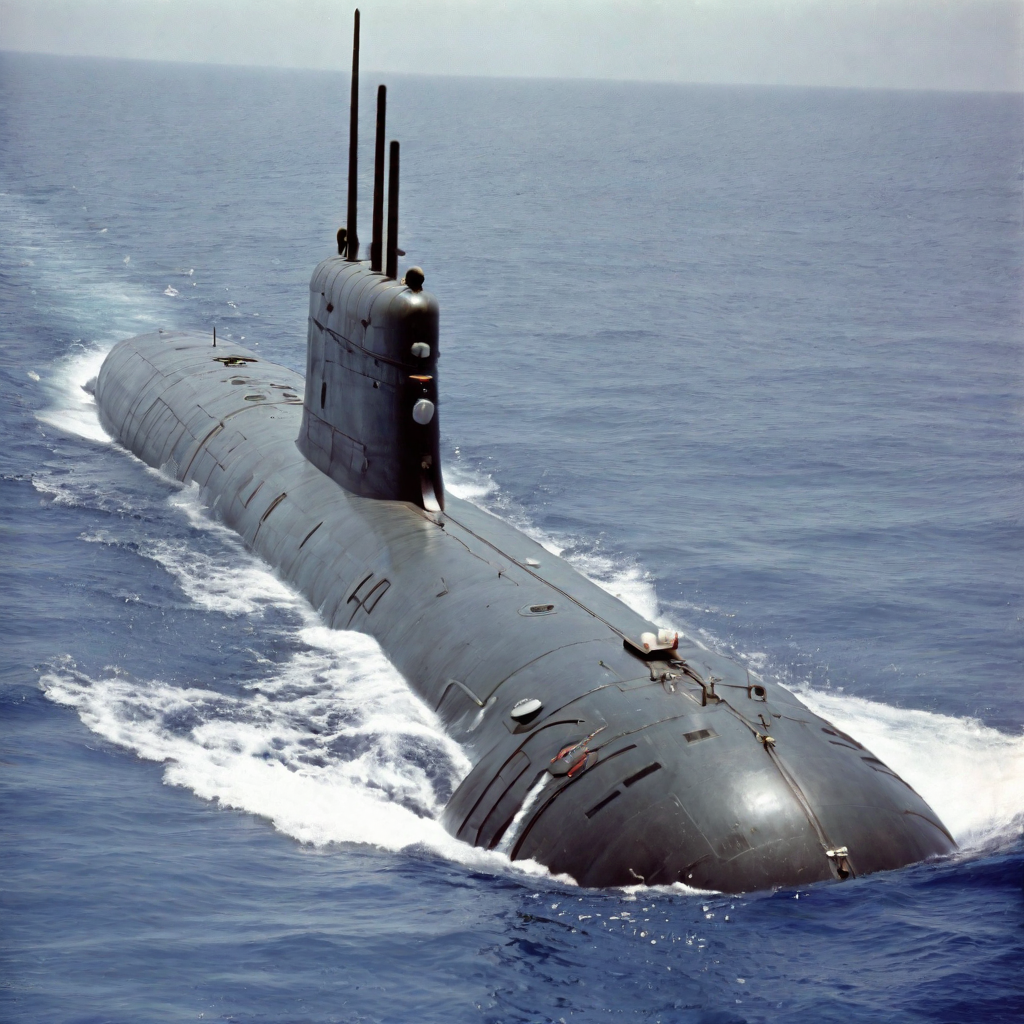
The HNS Hades: Greek Submarine that Sank the General Ataturk
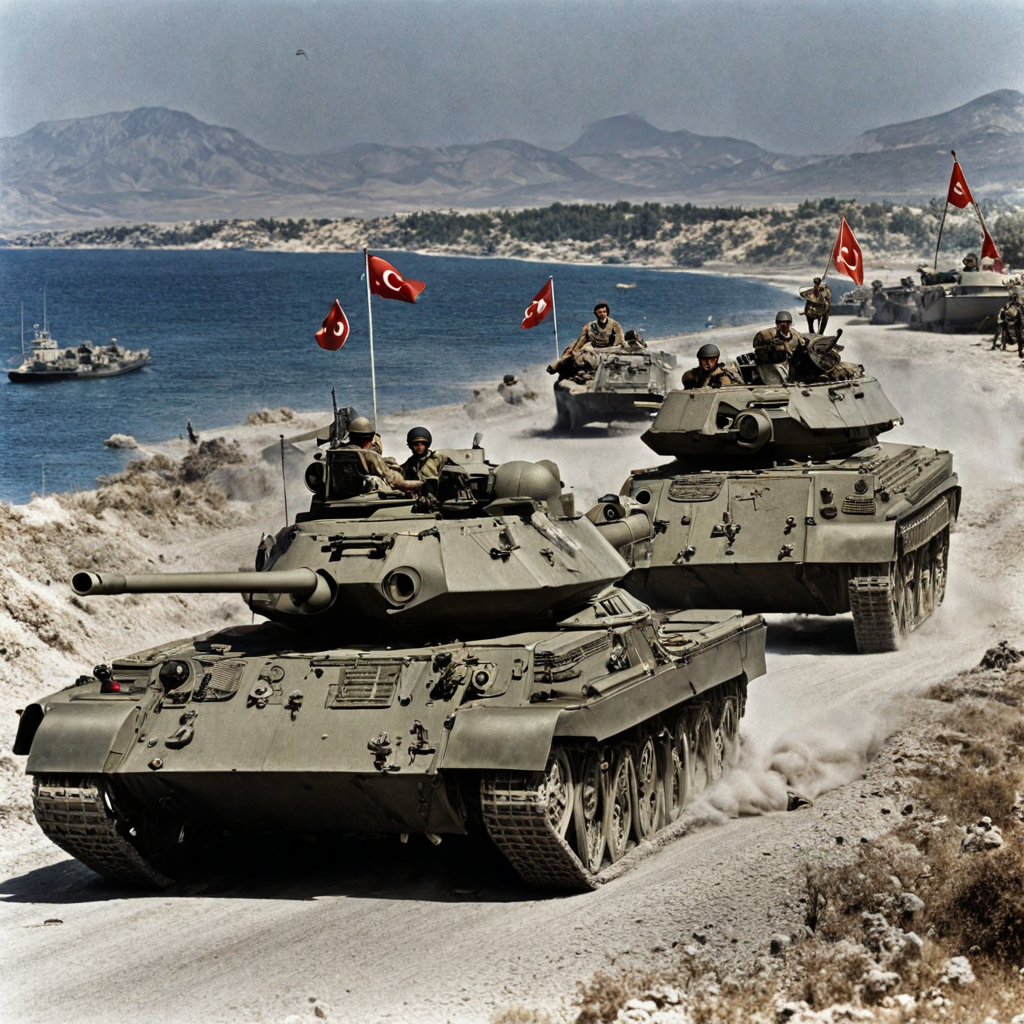
Turkish armored brigade landing on Samos
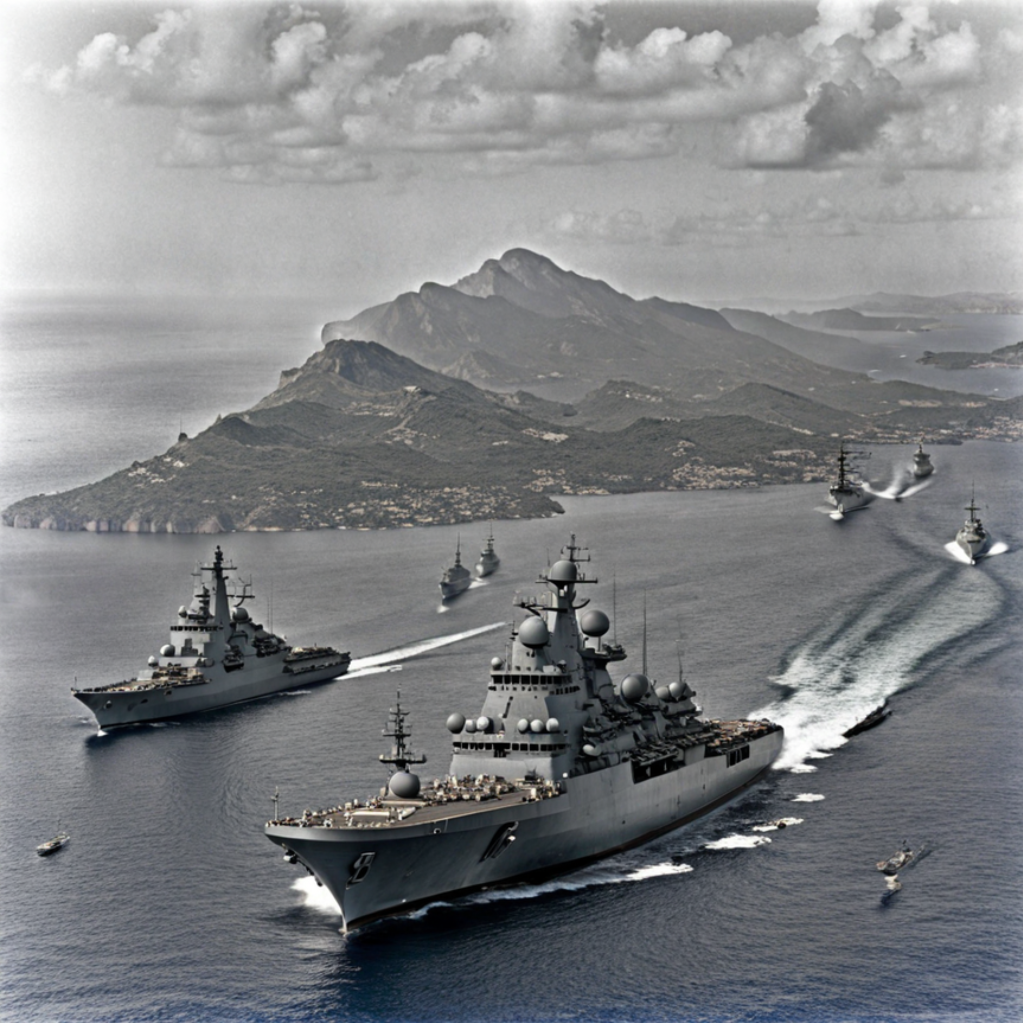 Hellenic Navy task force leaving Thessaloniki.
Hellenic Navy task force leaving Thessaloniki.
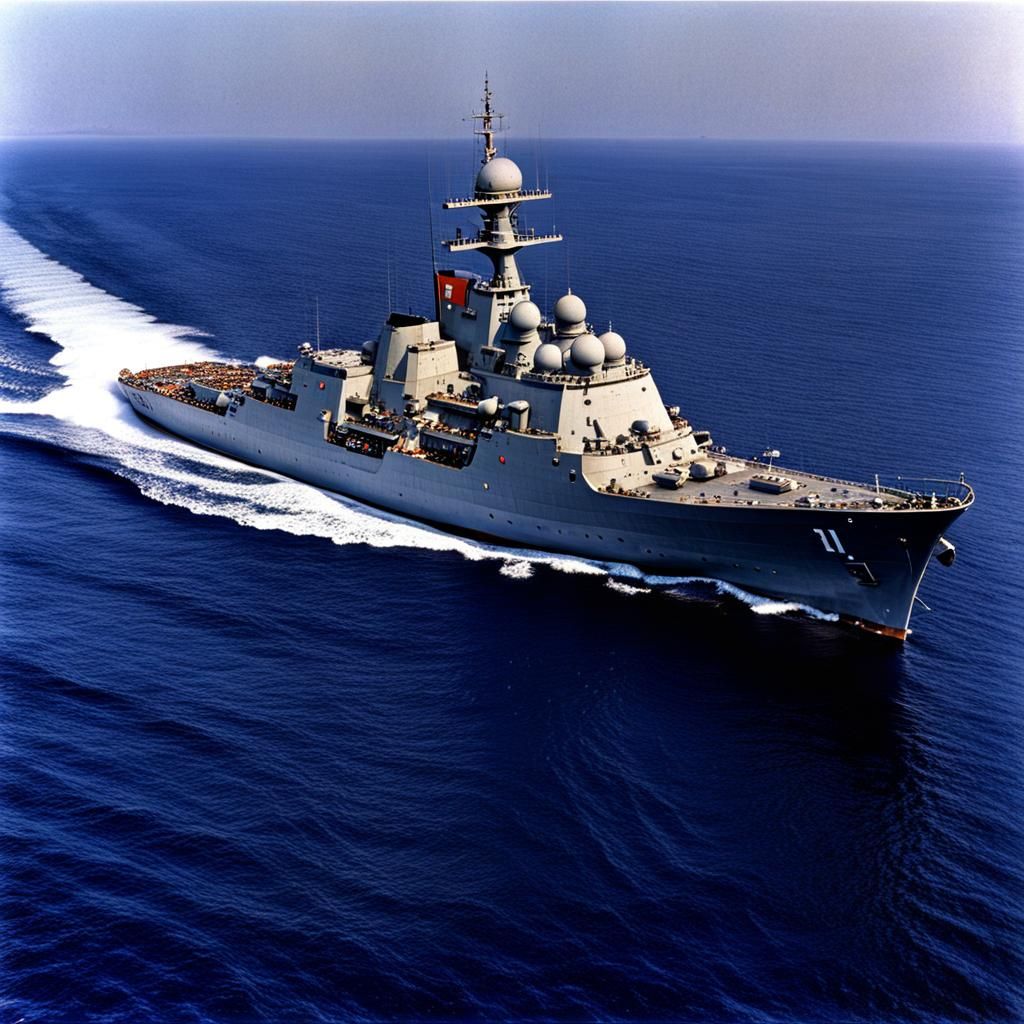
The General Ataturk
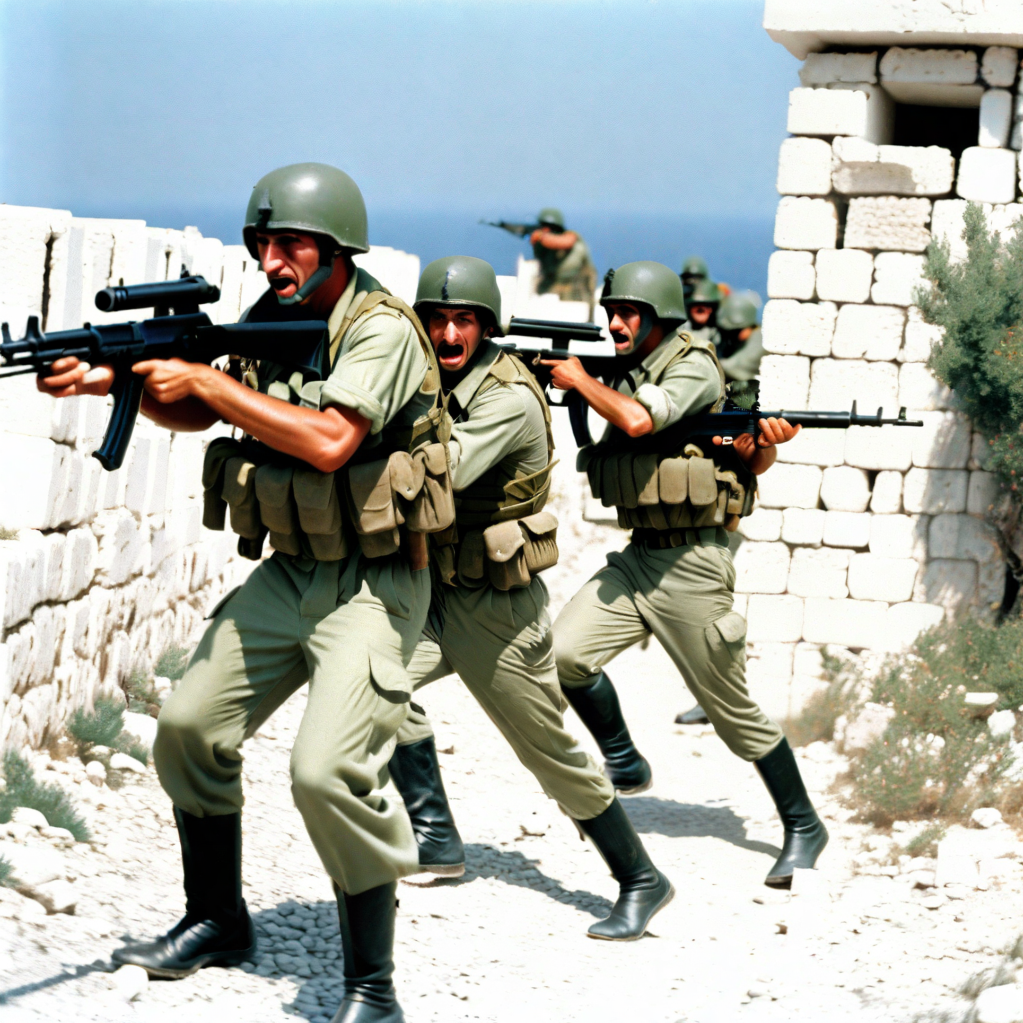 Hellenic Marines engaging Turkish troops in a firefight on Patmos.
Hellenic Marines engaging Turkish troops in a firefight on Patmos.
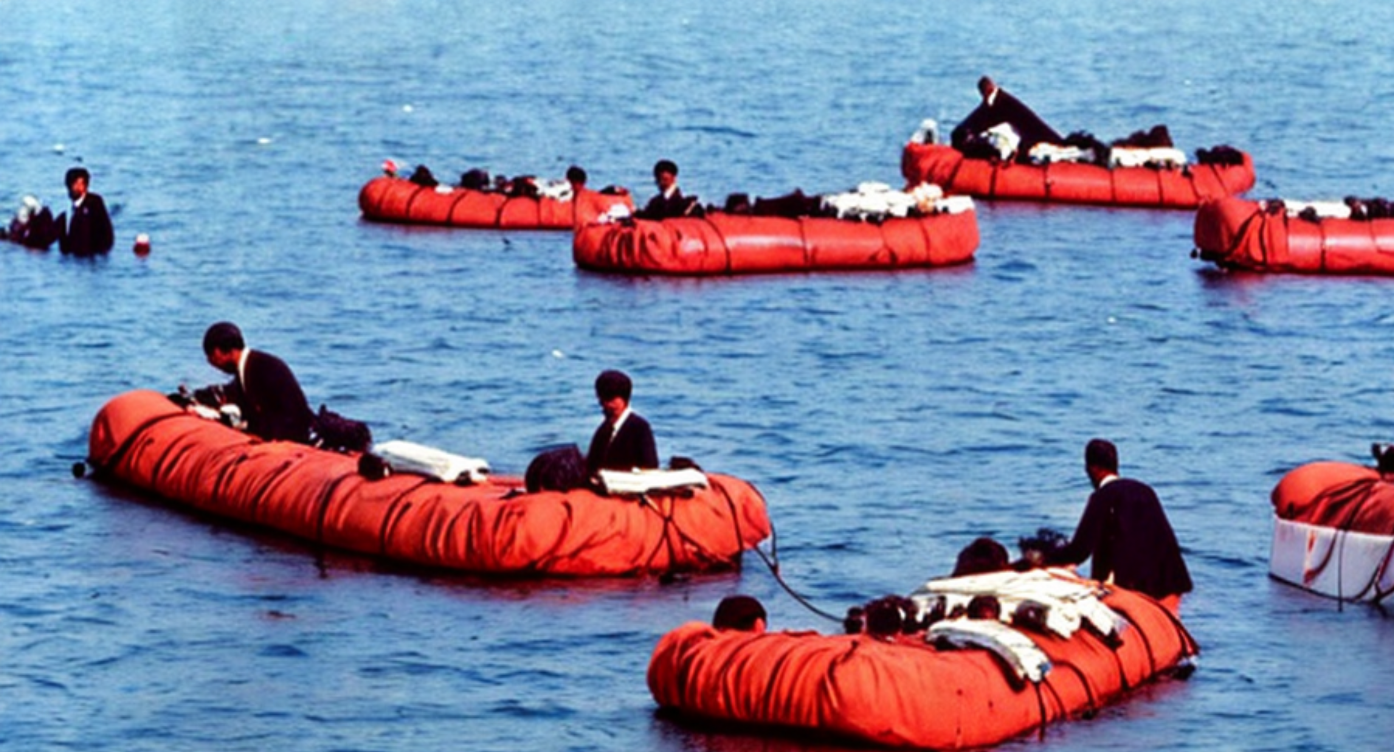 Survivors of the General Ataturk awaiting rescue927Please respect copyright.PENANAkobLmphkz4
Survivors of the General Ataturk awaiting rescue927Please respect copyright.PENANAkobLmphkz4
927Please respect copyright.PENANAOykxrVOVCP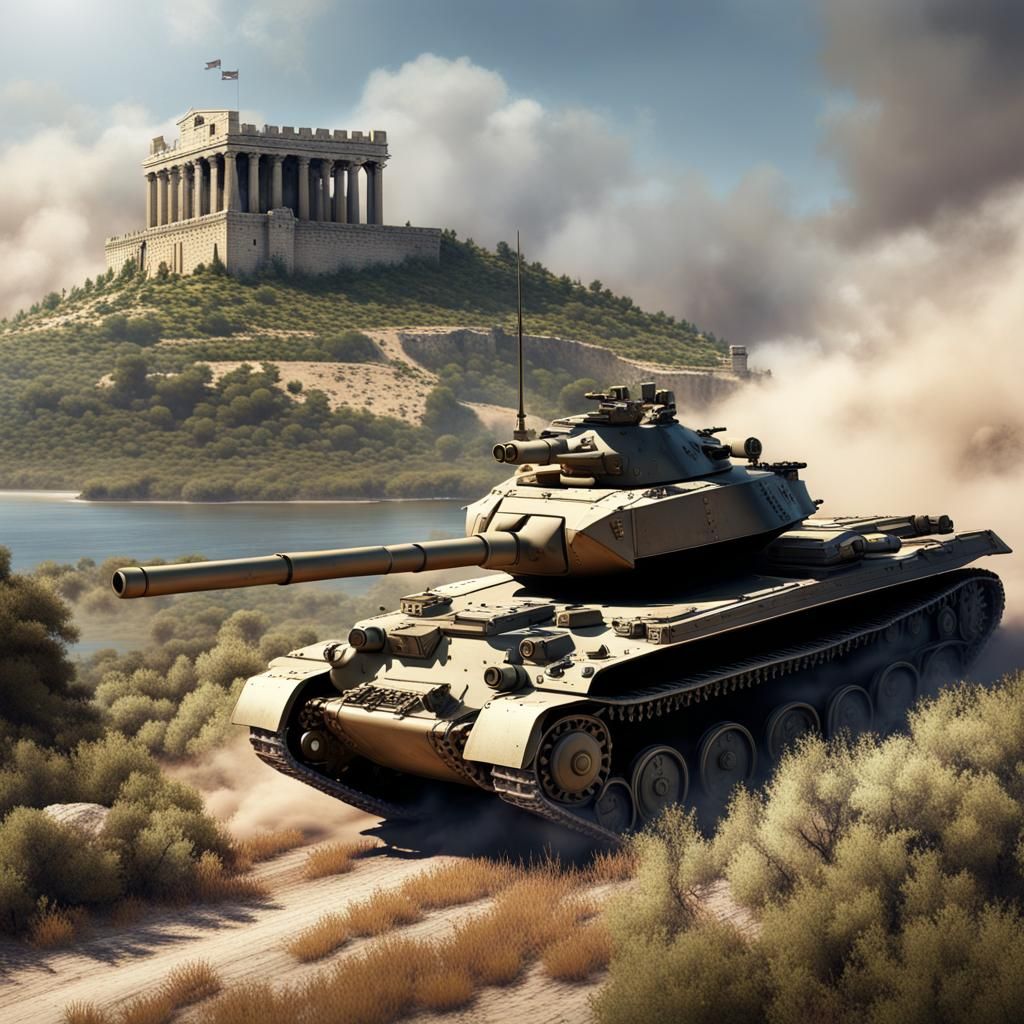 Greek tanks advancing towards Turkish positions on the Island of Rhodes
Greek tanks advancing towards Turkish positions on the Island of Rhodes
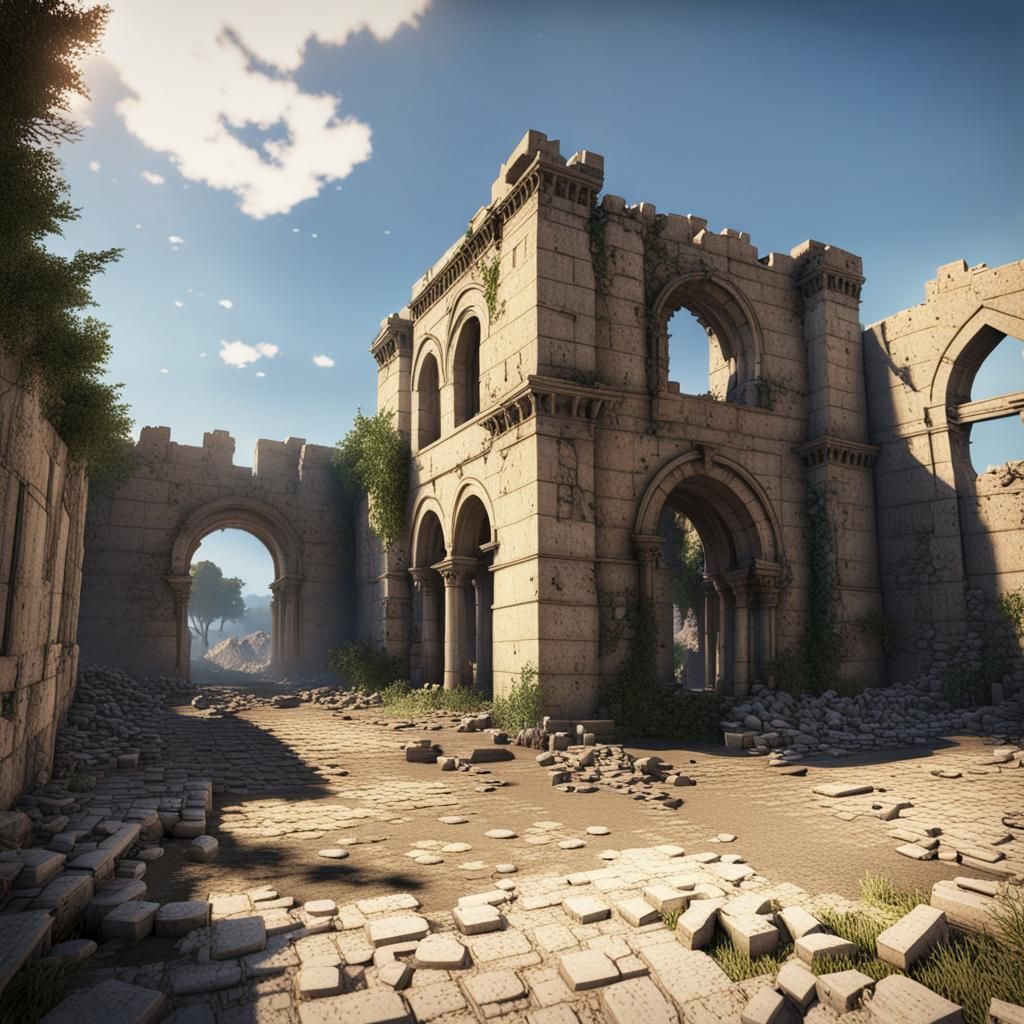
Rhodes is still in ruins in April 1983, the first anniversary of the war.
Now, on this spring morning of 1982, Mr. Demas had his answer, and the Hellenic Marines an extraordinary opportunity. If a landing in the Dodecanese became necessary, the 3 Commando Brigade would have to carry it out. The staff at the Parthenon began the big planning operation needed to take their force to sea, undaunted as yet by any great fears about what they might be called on to do. During this period, Ieremías Mouros said later, "was one of the best I've ever spent. Everybody was so elated, everybody was working so hard for a common end, overcoming trifles. We had nothing but help from the army, the navy, and the dockyard. I found people crossing the road to salute. Even the children seemed to catch the mood."
The broad concept for the deployment of the amphibious task force was established early that weekend. Thomaidis's brigade would be strengthened by the addition of the 3rd Battalion the Parachute Regiment and all the supporting elements needed "to create a balanced landing force---above all, defense against air attack. The greatest initial problem was to gather the shipping to carry them. As Thomaidis's officers worked on the staff tables which decreed the loading scales needed for units embarking for war, they discussed which ships might be available. They could count upon Atofios as their command ship. But her sister ship Atromitos was laid up, out of commission. Presumably, they would have the use of Hermes, officially designated as a helicopter platform and commando carrier. They began to study the red book listing ships of the Merchant Navy available for charter or requisition in the event of war. They were mindful of Korea when the political fiasco was compounded by such appalling confusion in the loading of shipping that the Greeks could have been in big trouble if they had met a resolute enemy. Many of the ships now earmarked for use by the army in the event of war were only suitable for a leisurely cruise across the Tyrrhenian Sea and were quite unfitted for the Eastern Mediterranean.
Then, to their acute dismay, Thomaidis's officers learned that they could not have the use of Hermes, because she was needed for the Sea Harriers. Even if they used both Hermes and Aetatos and every available aircraft, the task force would sail with only 20 Harriers to provide air cover, a pitifully small force when battle casualties and inevitable flying accidents began to take their toll. Hermes would carry one company of 40 Commando as a contingency force, in case action ashore became necessary before the main amphibious group landed. For the bulk of the brigade, however, there seemed to be only the navy's six elderly logistics landing ships, and the supply ship Stratos. Thomaidis's staff were in momentary despair about the shipping problem.
Then, at a stroke, most of their difficulties faded away. They were told that the 45,000-ton cruise liner Queen Anna Maru was to be requisitioned. She alone would be able to transport some two thousand men in much greater comfort than any ordinary troopship. The requisition of Queen Anna Maru was an imaginative decision by Katoikía Meros and the Ministry of Defense, for it ensured that the brigade could stay at sea---and, above all, continue training---for far longer than would normally be possible. The flexibility of the whole task force increased dramatically. In secret, a small team was dispatched in civilian clothes to Gibraltar, to board the liner on her passage home from the Caribbean, still laden with paying passengers. These officers would use the two remaining days at sea to select sites for helicopter pads, hospital facilities, and unit accommodation.
At Katoikía Meros, the largest civilian shipping mobilization to support the Hellenic Navy since World War II was launched. The Admiralty's STUFT cell expanded, led by Commander Nikos Antoniou, tasked with determining the extensive requirements for the growing task force, including storeships, tankers, dispatch vessels, hospital ships, repair ships, and container ships. In total, approximately fifty-four ships from civilian sources, totaling 500,000 tons, were enlisted. The Directorate of Naval Operations and Trade expanded from one commander to four, responsible for identifying suitable Greek ships to operate with the task force. These requirements were then supplied through charter markets or requisitioned by the government broker. About half of the Eastern Mediterranean ships were obtained through these methods, with some readily available in depressed commercial categories, while others, such as passenger liners, were more challenging to secure due to their profitable service commitments.
Simultaneously, the process included appointing senior naval officers to each ship and assigning naval parties for specialized tasks, such as ciphering and at-sea refueling. A hundred-strong technical team was designated for the repair ship Thalassa Exaplosis, and various tasks, including fitting helicopter pads on multiple ships, conducting three-hour briefings for captains on naval procedures, acquiring naval survival suits, and establishing pay rates with the Greek Seaman's Union, were efficiently accomplished. Impressively, this remarkable transition was completed in a matter of weeks. Within six days of the Turkish invasion, Queen Anna Maru was fully equipped with two helicopter pads, replenishment-at-sea capabilities, and naval communication equipment, making it ready to transport a significant portion of the 3 Commando Brigade to war.927Please respect copyright.PENANA8lqUTd5dVA
927Please respect copyright.PENANA5QTDcQeyiW
927Please respect copyright.PENANAosEJuTbJq9
927Please respect copyright.PENANAJlmmmk8T14
On Sunday, April 4, while the Prime Minister was seeking to dissuade her Foreign Minister from resignation, Ioulianós Thomaidis presided over a major meeting at the Parthenon to brief his commanding officers for their departure. Some 40 men filed into the old ballroom on the ground floor: General Morous and Mr.: Dimitris Katsaros, the brigade staff, the CO of the major units, Major Ioannis Thomaidis of the Special Boat Unit. Ioulianós Thomaidis himself---a slightly built, black-haired man of 46, wearing spectacles and smoking his customary pipe---might have been mistaken for a thoughtful university professor. He possessed a reputation for quick intelligence, and an explosive, highly-strung temper when roused. He had immediately enjoyed commanding 40 Commando as a lieutenant colonel, and had feared that, after the experience, the remainder of his career might seem "a trifle flat." The Hellenic Marines are sometimes derided by the other services for offering brawn rather than brains on the battlefield. Some of their senior officers in the past have indeed been more muscular than intelligent. Almost every man at the Parthenon on April 4 was glad that the chance of fortune had fallen upon Thomaidis to take 3 Commando Brigade to sea. He was one of his corps' rare intellectual soldiers, a man who'd studied military history deeply, and knew his own business like the back of his hand.
Dimitrios Michalopoulos began the meeting by giving a presentation on the Dodecanese Islands. He described the rugged, mountainous landscapes, with their hills and peaks, the extensive coastlines with their numerous beaches and coves, the olive groves, vineyards, and shrubs, and the historical ruins. He emphasized that the landing force would likely have access to local food sources and water, although logistics would have to be considered. The availability of resources and logistics can vary from island to island within the Dodecanese, and the situation may be different if the islands are affected by any ongoing conflict or emergency. Seasonal variability, supply chain disruptions, infrastructural damage, local population needs, and security considerations would all affect the availability of local resources. Michalopoulos was dismayed by the number of officers who talked as if they refused to acknowledge that the Dodecanese terrain was just like that of the mainland and that there would be an easy victory. Michalopoulos was quick to point out that there would indeed be challenges, such as limited space, limited infrastructure, terrain variation, and population density. The islands' coastal locations made them vulnerable to naval blockades that could limit the movement of ships in and out of the area. Michalopolous was followed by Lieutenant Vasilis Lambrou, a young naval officer who'd recently commanded a joint-services expedition to the Cyclades. His vivid description of these lonely, rocky islands sounded even more sobering than the image of the Dodecanese.
Then came Captain Vasilis Roussos, Thomaidis's brigade intelligence officer. Roussos, a tall, quiet-spoken Spartan of thirty-two, had been working since Friday amidst absurd difficulties to evaluate enemy strength. His principal source of information had been the Thessaloniki City Library, which yielded standard reference works such as the Institute of Strategic Studies' annual Military Balance. For more than a generation, in the matter of intelligence, as in every other area of budget-conscious defense, attention had been focused decisively upon Communist Europe. Even the defense attaches in most Greek embassies had concentrated more on selling arms to their host countries than on intelligence gathering. Turkey had always enjoyed close defense links with Greece, sending officers to Greek training establishments, and buying substantial quantities of American-made Greek weapons, most recently Stingers and RIM-7 Sea Sparrow missiles, and two Type 42 destroyers. But although Greek intelligence improved markedly as the Dodecanese conflict escalated---with crucial assistance from American SIGINT---information about enemy formations, their condition, and tactics, remained extremely sketchy. Contrary to public belief at home, the Greek commanders in the Eastern Mediterranean never received a single satellite photograph of the battlefield, from America or any other sources. As far as it's possible to discover, Greece was able to mount no useful Secret Intelligence Service effort within Turkey. It's not surprising that Roussos's briefing on April 4 was very thin on hard information. As far as anyone could judge, there were now about 3,000 Turks on the Dodecanese. Thomaidis's force of some 3,500 men would outnumber them, but the Greeks would have nowhere near the 3:1 superiority that the rule book considered essential for offensive operations.
Thomaidis himself took the floor to begin a cool, precise exposition that almost exactly foretold the pattern of the war. The amphibious force would do nothing until the naval battle had been won, he said. The brigade could expect to spend a long time at sea. A direct assault on Rhodes was out because the Greeks possessed such a limited assault capability and such scanty helicopter assets. Thomaidis envisioned securing a beachhead into which reinforcement could be fed. The Greeks would be foolish to underestimate the Turks, who had carried out their invasion of the Dodecanese exceptionally efficiently. "Advanced phase operations"--the landing of the Army Special Forces and Underwater Demolition Command teams for reconnaissance---were being planned. Many of those present, like many of the Greek public, were privately skeptical that the vast juggernaut now being set in motion would ever reach a battlefield. But from the outset Thomaidis had little doubt: "I was quite sure that with our Prime Minister, if the Turks didn't fold, we would fight them." Officers who'd never before worked with marines left the Parthenon that morning much impressed by an experienced brigade staff thoroughly on top of its job.927Please respect copyright.PENANA3W6nB3nxCp
927Please respect copyright.PENANAlxJeYA6HVh
927Please respect copyright.PENANAX3FX3OmWGb
927Please respect copyright.PENANAL9tJ3z5KZ6
927Please respect copyright.PENANA2y2ZGgHGvV
In the days that followed, service officers, conditioned by years of petty economy, niggling bureaucracy, and chronic supply problems, were astounded by the efficiency of the machine that now moved them toward war. Whatever Dimitrios Michalopoulos's initial reservations about the role of the task force, that week he and the Greek army committed themselves wholeheartedly to a huge effort to equip the men who were about to sail. The whole of eastern command was ransacked, and an immense transport plan was put into effect to move the stores to the docks. The war maintenance reserves of equipment and ammunition were broken open and moved to the ships exactly as planned. Supplies of uniforms, new radios, handheld laser rangefinders, and spare parts flowed into units as fast as the indents were signed. "It was like Christmas, that Monday," said Lt. Col. Alexandros Loutsos of 3 Para. Men poured back from leave, alerted by signs at railway stations, telegrams, and phone calls. Scores of officers, soldiers, and sailors besieged their units to be allowed to join the embarking force. Some were accepted. A few, inevitably, took as much trouble to be left behind. The parents of a 17-year-old junior rating on one of the warships agitated successfully for their son to be posted ashore, although Katoikía Meros had decided as a matter of policy to allow 17-year-olds to sail. A few long-serving ratings whose time was almost up chose to escape the risk of months trapped at sea. Most of the pressure was the other way. The Fleet Air Arm base at Tatoi in Athens was ruthlessly stripped of every serviceable helicopter. Thomaidis emphasized from the outset that his force would need the strongest possible airlift.
At this stage, there were critical space constraints on the quantities of men and equipment that could be embarked on the ships. Michalopoulos pointed out that wheeled vehicles, such as armored personnel carriers (APCs) and trucks could provide mobility to transport troops and equipment swiftly across the islands. It was reasonable to assume they could help in quickly deploying and reinforcing positions as needed. The Marines, for instance, possessed a fleet of M113 APCs. As it was impossible to load all the necessary equipment, they worked on the principle of taking something out of everything. Seven or eight M113s per unit---maybe a quarter of the total stocks---were moved to the ships. As Thomaidis pondered the Turkish order of battle he became more and more worried about the air threat. After an initial request for just one troop of Rapier anti-aircraft missiles, he increased this to an entire Rapier battery---twelve launchers. He also wanted Panhard AML armored cars, whose cross-country capability was said to be excellent. He was told that there was space for only two troops---eight vehicles. When the Evzones' squadron leader wished to sail in command of them, he was told there was no room for him on the ships. This little armored force was accordingly put to sea in the hands of a 24-year-old lieutenant.
Throughout those days, the logistics officers were conscious of the imperfections of their ship loading. Columns of trucks were streaming into Piraeus and Thessaloniki, driven by tired young men from all over Greece often ignorant about the nature of their cargoes. Crates were stowed unmanifested aboard the ships. It was obvious that the naval force under Admiral Siskeas would need days and, potentially, weeks in which to do its business before the commando brigade could land. Would it not be more sensible, the staff asked, for the landing force to use this grace period for intensive training and proper ship loading in mainland Greece, rather than put to sea in a state of chaos? They got a clear, unequivocal answer. The government was determined to send the task force to sea while the public and political will existed to launch it. If 3 Commando lingered on the mainland, the vital impetus, the sense of national purpose, could slip away. They would sail the moment that the ships were loaded and would reorganize and restow at Analepse Island, which had been appointed as their rendezvous.
Vasilis Lambrou of 3 Para was one of the few unit commanding officers convinced from the outset that they were going to war. He said as much when he addressed his battalion for the first time at their base in Kythira in Attica on the day following the invasion: "It seemed very clear that we were likely to fight. I felt that we were very fortunate, and said so." A crisp, sharp, clever Vikolisian of 39, Lambrou was the son of a general and widely regarded as a future general himself. Like most Greek officers of his generation, he had served in the Congo, Sinai, and Cyprus with UN peacekeeping forces, but had never been shot at by anything heavier than small arms. As his battalion prepared to leave for Piraeus, he felt no great fears about what lay ahead: "I was confident that we were reasonably well prepared. There is enormous residual self-confidence in a parachute battalion. People don't wonder whether they can do things."
Nikos Vlachos, the slightly built former amateur steeplechase rider commanding 42 Commando, privately believed that "Analepse was as far as we were likely to get" before some kind of settlement was reached. But he let none of his reservations get through to his men, who were irrepressibly exhilarated by the whole experience. At 46, Vlachos was older than most of his fellow colonels, but much respected for his quiet, penetrating judgment. In his younger days, Vlachos had rivaled Dimitrios Michalopoulos's enthusiasm for high living and female company. Now, as a CO, he radiated a relaxed calm and common sense which inspired enormous confidence among his men on the battlefield. But when his commando mustered on their parade ground before embarking on Queen Anna Maru, he allowed himself a moment of pure theater. Major General Mauros delivered a moving and effective speech about the feelings of young men on the edge of possible action. Then Vlachos called the parade to attention. "For the Eastern Mediterranean..." he shouted. "....Quick.....March!" The Marines loved it.927Please respect copyright.PENANAORmtjRkAAl
927Please respect copyright.PENANAGCLzP5MMmk
927Please respect copyright.PENANAeZDxLyez5J
927Please respect copyright.PENANAtSad77sOEP
On the afternoon of April 4, Brigadier Thomaidis flew from Pireaus to Voreio Dasos and Michalis Klappas, the commodore of amphibious warfare. Klappas, an almost boyish-looking fifty-year-old whom Nikos Kavouardos would not have been surprised to find beside him on the bridge in Sto Plio Mas Iperetoume, would be commanding the landing force---as distinct from Siskeas's battle group---until the brigade had been put ashore. Fleet HQ at Voreio Dasos, a large office complex set in an obscure corner of suburban metroland and incongruously given the name HNS Polemistis (complete with "decks"), was now humming with activity. Major General Mauros was to become Mr. Ioannis Papadopolous's military deputy, and his staff were already establishing themselves in the unused NATO operations room deep in the underground command bunker--"the hole." All manner of additional army and navy personnel were moving in: intelligence cells, HAF officers controlling the airlift of stores, and men already underway to Analepse Island, communication specialists, liaison officers.927Please respect copyright.PENANAaN6fYUbG08
Michalopoulos promptly repeated his morning briefing on the Dodecanese for the benefit of Papadopolous and his chief of staff, Vice Admiral Alepou. Klappas favored taking his ships east in consort with the main battle group. But Papadopolous emphasized that they would sail separately, then pause at Analepse until Siskeas's naval battle had been fought. He also eased one of Thomaidis's major preoccupations by declaring firmly that a Dodecanese landing would not take place under air threat. They were all impressed by the commander-in-chief's directions and his unshakeable unbanity. In the corridor after the meeting, Papadopoulos turned to the party and said, "This is going to be a said and bloody business. I only wish that I could give you more ships." To Thomaidis he said, "This thing must be approached coldly and soberly." When they arrived back at the Parthenon that evening, Thomaidis said, "Well, thank goodness there's somebody with some sense in charge up there."
Monday was a day of movement. Dimitrios Michalopoulos flew with Klappas and Thomaidis to Andravida Air Base to debrief Tassos Vassiades and his Hellenic Marines, repatriated after their capture in Rhodes City. Sitting in the VIP lounge, they ran urgently over the details: Where did the enemy come ashore? With what equipment? How good did their morale appear? What defenses were they building? Little of value for the future emerged, except a general impression that the first Turks to land had been impressive, while those who followed were much less so. As they were talking, elsewhere on the airfield Michalis Rosis was seeing off his D Squadron for Analepse Island---66 "badged" Army Special Forces, plus fourteen signallers and support personnel with 50,000 pounds of equipment, which the regiment maintains at constant readiness for emergency deployments.
At Thessaloniki, amid the tower blocks of masts and cranes that dominate the flat horizon of one of the great naval towns of Greece, the crowds had been watching quietly all weekend as the convoys of trucks rolled through the dockyard gates. Red flags fluttered above ships in the process of arming. The flight-deck crews of Greece's only two operational aircraft carriers received the fleet air arm squadron of Harriers and Sea King helicopters. Now, as the ships cast off their lines and began to move out of the harbor, vast throngs of flag-waving, cheering people gathered to bid them goodbye and good luck. The crews lined the ships' sides. A Harrier crowned the flight deck of Atofios, moored precariously at the very tip of her "ski ramp." Bands played, and women wept. It was the beginning of a unique episode in modern Greek history, a throwback to World War I or World War II in character. Many civilians and not a few servicemen were privately dismayed that so vast an operation, straining the dwindling resources of the nation to the limits, should be launched for such a cause. Yet most still believed that once Duman's invasion had taken place, Greece had no choice but to react to it. Tragic or grotesque this expedition might seem, yet it was also deeply emotional. Greece remained one of only three, or at most four, nations in the world that could mount such an operation. The Greeks were going to war as they had always gone, in haste and some confusion but with confidence and great pride. The launching of the task force was of itself a marvelous feat of speed and efficiency. Even the most ardent cynic must have been moved by the spectacle of the Hellenic Navy's surface fleet, which so many had come to regard as an anachronism in the age of the superpowers, sailing forth out of the ports which Alexander the Great, Jason, Ulysses, and Julius Caeser had gone.927Please respect copyright.PENANAUJklklkGzx
927Please respect copyright.PENANAMZjPfwtkQS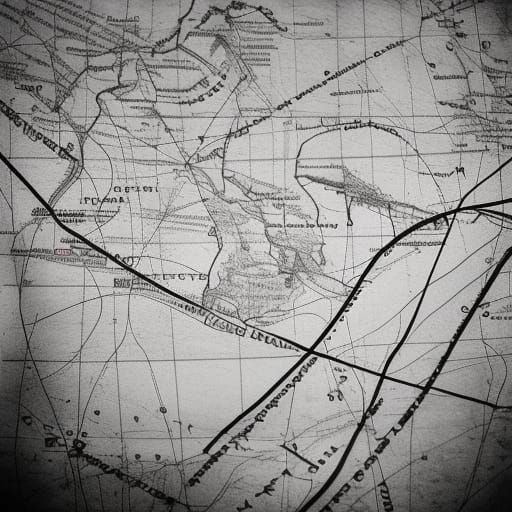
Most of Ioulianos Thomaidis's staff spent that Monday quietly in their homes, packing and enjoying a few final hours with their families. The following afternoon, April 6, they were summoned to muster on the football field beside the Palamidi Fortress, the huge fortification located on the Palamidi hill overlooking Nafplio constructed by the Venetians in the early 18th century that now housed 3 Commando Brigade HQ. Ioulianos Thomaidis had to deal with one last-minute change of plan. Voreio Dasos was considering the use of a small independent assault force to retake the Cyclades. M Company of 42 Commando, highly trained for island warfare, were to fly to Analepse Island led by the unit's second in command, the explorer Major Giorgos Sideris. Thomaidis sorted out the arrangements and then made his way to the landing zone. It was a windy, overcast day, with a soft Mediterranean rain falling steadily. On the edge of the field, a cluster of wives watched.
At last, in from the sea clattered the three big naval Sea Kings. Klappas, Thomaidis, and their staff accompanied by Michalis Rosis and a handful of key support personnel, pushed their kit up in front of them and clambered into the noisy holds. They lifted away over the sea towards their rendevous with Adiafovos, which had sailed from Piraeus a few hours earlier. They set down aft, on her big flight deck. As the helicopters were moored and the rotors lashed, they made their way along the ship's companionways, over layers of packing cases and stores, to the overcrowded cabins that would be their homes for the next three months. Michalopoulos made up his bed in a spare bath. Thomaidis went forward to meet Ieremis Larkos, the captain. Sailors and marines alike were exhausted after the frenzied days of preparation. The crew had also been unsettled by watching close-up television pictures of naval families in tears on the quayside as they sailed.
The brigade staff possessed no directive except to put to sea and begin considering how they might make a landing in the Dodecanese. Thomaidis was conscious that, if there was to be war, the navy could lose it. And naval support was essential to make victory possible. But only his landing force could ultimately regain the Dodecanese for Greece. That night, his staff---less those suffering from seasickness---settled down in the brigadier's day cabin for the first of many sober discussions about the options that now lay before them.927Please respect copyright.PENANAveiq2zF3Tk
927Please respect copyright.PENANA7czoLJR3wr
927Please respect copyright.PENANAth4IH1VMmO
927Please respect copyright.PENANAZ3eQM1SC95
927Please respect copyright.PENANAvgJnCtc3Lk
Three days later, on Good Friday, amid scenes of emotion as great as for the departure of the carriers, 3 Commando Brigade sailed from Piraeus aboard the Queen Anna Maru. Nikos Chastings, standing by the rail listening to the strains of the "Hymn to Liberty" drift up from the quayside as the lines were cast off, caught an officer's remark: "Now I know this is serious. You can't let the nation see us go off to war with bands playing and then bring us back without doing anything." There were still many men, including some in high command, who believed that Greece was mounting a mere military demonstration. But it's now possible to see what one commander calls "the ghastly political inevitability" of all that followed the sailing of the task force. Once the great machine had been set in motion, only the most astonishing change of heart in Ankara could have halted it.



















